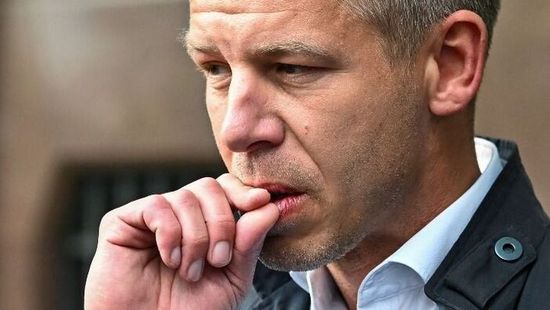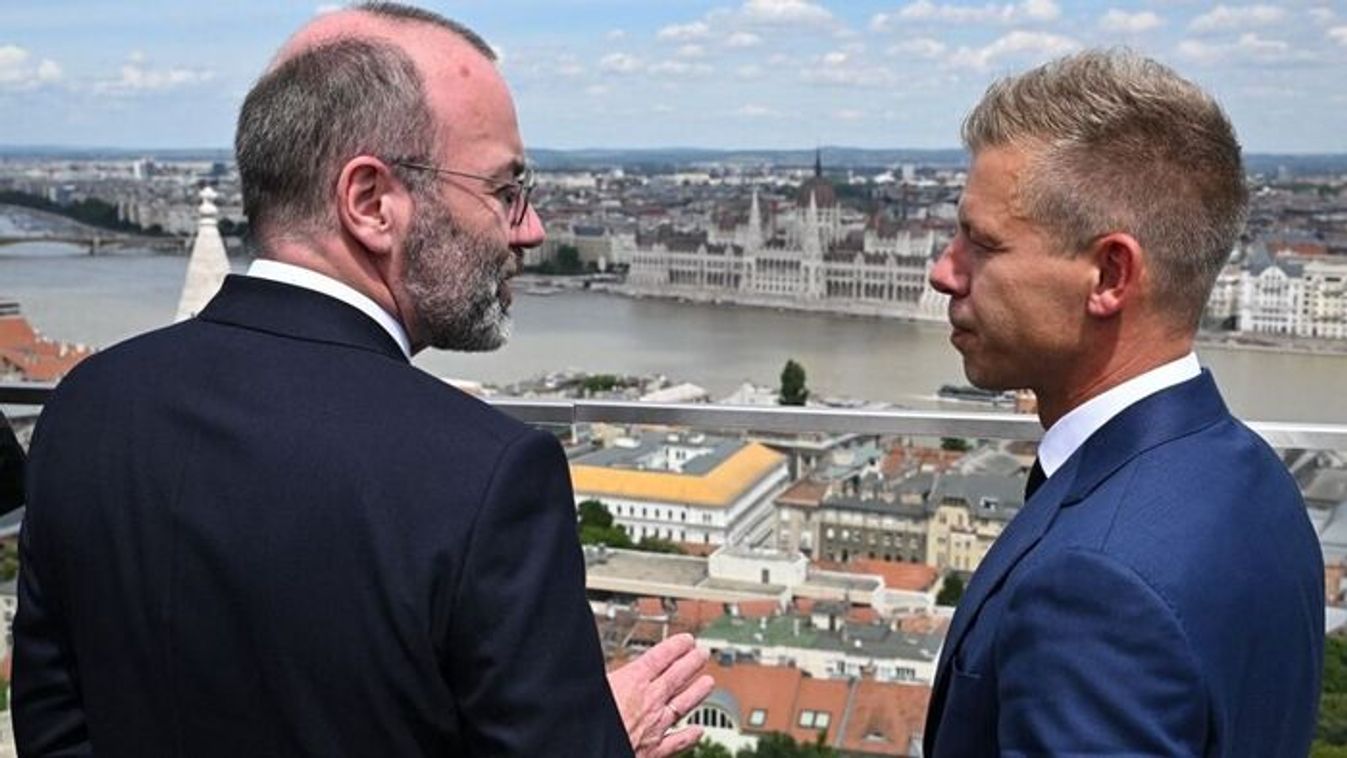Ez is napvilágot látott: Magyar Péter tudhatta, milyen bosszút forralnak Magyarország ellen

A szakértő szerint közölték a Tisza Párt elnökével, mi a feltétele a hivatalban maradásának.

"If you permit your country to become economically needy, he believes, it will be used against you. Whatever the energy sanctions mean to the European Union, it makes economic sense for Hungary to try to avoid them" - Christopher Caldwell pointed out in a conversation with Lénárd Sándor.

Russia has brought a protracted war again to Europe by invading its neighboring Ukraine. Such war has been unknown in Europe since at least the Yugoslavia conflict in the 1990s. It became obvious that the fall of the Soviet Union did not end history, nor did globalization make geography irrelevant. Furthermore, both the East-West confrontation and the inability of Europe to call for order in its own continent are again evident. And again, the United States has made itself a central player in the conflict. What is the chain of events in your view that led to this devastating war?

As you said, this conflict could be compared to the breakup of Yugoslavia. Even to Czechoslovakia, in the sense that it is unfinished business from the Cold War. The 20th century — as you know in Hungary — altered borders in ways that are arguably artificial. It is pretty astonishing that we emerged from the Cold War without changing many borders. Yugoslavia was an exception. It was a bloody exit from the Cold War. The Czechoslovakia breakup was more successful.
In the early 1990s, Ukraine looked like a divided country in danger of a very difficult break-up. The sentiments of Crimea and some of the richer parts of Eastern Ukraine were with Russia. This was obviously a very difficult problem. It has complicated life in Ukraine for the last thirty years and now things have exploded.
One thing that has happened in the United States, is that we have tended to forget this Cold War context, and lost sight of what a complicated and delicate situation this is.
Like most powerful countries, we prefer to look at things in a simple ethical context: good guys on one side and bad guys on the other. But the problem is much deeper and more bound up with histories that we don’t fully understand.
Since the famous “Long Telegram” from 1946 and the “X Article”, “The Sources of Soviet Conduct” from 1947 by George Kennan, it is obvious that the behavior of Russia has been rooted in a deep insecurity that leads to the need of a buffer zone around their country. In light of this longstanding observation, what could be the motives behind the American behavior and their central role behind the war?
George Kennan was the guiding spirit in American thinking about Central and Eastern Europe from World War II until the 1980s. I am not sure that his thought has much to do with the way the United States sees Russia today. But it reminds me very much of a book by the Russian-born Hungarian historian Tibor Szamuely, who defected to England in the 1960s. His most important book, The Russian Tradition, was published in the 1970s, after his death. His idea of Russia’s problem with its neighbors resembles Kennan’s. Szamuely calls Russia’s situation a “permanent emergency.” Partly because of its size, Russia has a lot of defensive resources. But also because of its size, it is always vulnerable somewhere. As Frederick the Great said: He who defends everything, defends nothing.
By its nature, Russia is a difficult country to deal with.
It is hard to understand Russian strategic thinking from the outside.
What is different between this war and previous conflicts is that the appeal of the United States to rally to forge a “world community” in defense of the American-built world system and against Russia is weakening. How do you see this phenomenon and what are their potential consequences? Is it the appeal of the narrative or the material resources behind it that has weakened?
It's better to address this question objectively, in terms of material resources. The relative weight of the United States in the world economy has shrunk. Power has been gradually migrating from the North Atlantic to Asia. Before the Iraq war, for instance, the United States and Europe accounted for 70% of world GDP. Now it is down to 43% — still a lot, but a relative decline. The declining appeal of the narrative that you mention is also important. One thing that makes it more difficult to rally other countries is that the Iraq war has happened.
That war, however noble its intentions, caused the World to doubt American judgments
about where intervention would help and where it would not.
The approach that the European Union as well as many European countries are taking seems to be a bit perplexed. Even though Europe is hardly capable of defending its own continent, let alone deterring others, and it does not have the necessary strength to handle this crisis, it increasingly gets entangled in efforts to do so. It apparently wants to do everything it can in order to make Russia pay a very high price for its aggression against Ukraine. But what is the price that the West will have to pay if it definitively alienates Russia? What is your view on this contradiction?
The military and economic relationship of Europe to the United States is complex. Sometimes the distribution of responsibilities is hard to decipher. Let me draw an analogy. Within the European Union, transfers of structural funds generally go from West to East. Brussels, Paris and Berlin tend not to understand the complaints of the Central Europeans. But actually, this transfer money could also be thought of as compensation. Poland, Hungary, Slovakia and other countries of this region once expected to “catch up” to Germany and France. But the way the EU economy is organized today, they are the labor pool for a Western Europe that gets to do more lucrative brainwork. They have been frozen in a position subordinate to the West.
Similarly, the complaint by Donald Trump and others that Europe does not spend enough on defense is true in a superficial way. However, Europe is also doing a lot of the economic work that is necessary to bind the European continent in a workable Western defensive alliance. What looks like European weakness may actually be part of a division of labor. The United States is the center of military technology. Europe is doing sanctioning because that is part of its economic role.
As far as the costs are concerned, Europe has become dependent on affordable Russian energy. In pure economic terms that has been their best option in the past few years. If they have to give it up, it will cost them some money.
I am not as optimistic as some Europeans that they will be able to replace it with renewable energy.
What is more worrisome in the long run is the forced withdrawal of Russia from the international economic institutions such as the World Bank, IMF, SWIFT Banking system etc. These international economic institutions are the real source of American power and global leadership.
Applying sanctions may lead other countries, such as India and China, to place a priority on independence from American-led institutions.
They might worry that these institutions will be used against them in the same way.
How do you see the more realistic approach the Hungarian Prime Minister represents during the European debates urging peace negotiations?
Hungary is geographically closer to Russia than other European countries, and more heavily dependent on Russian energy. Sweden, for example, with its hydroelectric resources, is not so dependent.
Whether the policy is realistic will be decided by measuring how much economic benefit Hungary gets out of it against how much political ostracism it gets from the European Union.
After the Italian election, Hungary might be better protected from paying a political price.
A very interesting aspect of Viktor Orbán’s time in power has been the priority he has placed on protecting Hungary’s economy from economic pressure from without.
If you permit your country to become economically needy, he believes, it will be used against you.
I think he is right about that. Whatever the energy sanctions mean to the European Union, it makes economic sense for Hungary to try to avoid them. It should not be automatically dismissed as simply pandering to Putin.
In some sense, this war is a wake-up call for Europe. What are the most important lessons to be learnt for the future of Europe in terms of strategic autonomy?
Europe is very dependent on the United States, and I do not see any prospect of what you call strategic autonomy in the short or medium term.
The real wake-up call, to all of us in the West, is that we ought to think more about history.
We must stop assuming that every conflict is an abstract ethical problem.
Russia and Ukraine have a lot of complicated and specific things to say to one another. To help sort out these problems, Westerners need to listen to Russians and Ukrainians, not just sound off about their own “values.” We need to look at how Ukrainians and Russians understood each other in 2014, in 2004, in 1989 in 1917 and so on. That is what we really need to wake up to.